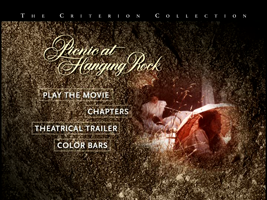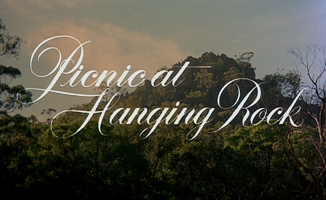directed by Peter Weir
screenplay by Cliff Green
from the novel by Joan Lindsay (1967)


Criterion #29.
(I needed to take some time to really separate the names “Peter Weir” and “Nicholas Roeg.” These guys have absolutely nothing to do with each other other than that each has an unusual four-letter last name and each has made at least one spooky movie about Australia, but that seems to be enough for my brain to mix them up. Key points: Nicholas Roeg is not himself Australian; Peter Weir is. Nicholas Roeg’s career since the 70s has been almost entirely eccentric whereas Peter Weir became increasingly commercial. Nicholas Roeg: Don’t Look Now, The Man Who Fell To Earth, The Witches. Peter Weir: The Last Wave, Witness, Dead Poets Society, The Truman Show, Master and Commander. These guys have absolutely nothing to do with each other.
I’ve now taken the time. This will not be a problem again.)
I bet you’re reading this because you want to know what happened to those girls who mysteriously disappeared at Hanging Rock! Sorry, guys, I don’t know.
Oh fine, I’ll tell you. They passed out of objective time and into dreamtime, transcending the logic of narrative just as the trance of the sensual transcends the rational mind. (Whew! Case closed! What a relief to wrap that one up.)
Thing is, if you’ve seen the movie you already knew that. And yet you still probably felt like there was a mystery here. That’s the point. The point is that just as the irrational can never be reconciled to the rational, a movie can shout and shout “This movie is about the irrational!” and people still won’t be able to stop themselves from writing that this film, ahem, “raises more questions than it answers.”
That’s not true in the most important sense; the movie makes its intentions very clear. It rather belabors the point, in fact. The first 30 minutes are something special and lovely indeed but after that it does tend to go on. (Not that I particularly minded — possibly because I had been so soothed already. Which suggests a good rule of thumb for filmmakers: if you start your movie with a hypnotic induction, the audience will be very forgiving of the rest.)
I picture a sign in a hotel lobby: “WELCOME QUESTIONS WITH NO ANSWERS CONFERENCE!” I did not find this movie mysterious as a movie; it was well marked. It was about mystery. It basks in it and then shows us characters struggling to come to terms with it one way or another, which is of course what cannot be done. They resist it at their peril. But there is no “it.” Non-being.
The idea of a horror movie about calm pleasantness, about the cosmic menace implicit in all experience, thrills me and whispers very close to my heart. This is only partially that, but when it was, it felt precious to me. The first section is sort of like Vermeer as horror. Or more on the nose would be Pre-Raphaelite stuff, which often seems to be deliberately cultivating those undertones. (A reproduction of this one is shown briefly in the movie.)
Don’t come telling me this movie is an allegory about sexual awakening. I am so sick of that shit and I will fight you. I pity the people for whom sex is the only form of mystery they are willing to acknowledge, and even then only as a kind of conspiracy to be unmasked. But pity shades pretty readily into resentment because these sorts of people will never stop trying to get you to see what they see and “admit it! admit it!” They should take note that there is a bad guy in this movie, but it’s not some Moby-Dick of the universe gobbling up unsuspecting girls; it’s petty headmistress Ahab who suppresses her awareness of the numinous and ruins lives. Don’t be like her! Don’t come springing your shit on me.
Also, the movie tells us several times over that the girls who returned from the rock were QUITE INTACT. The smug hypocrites with their “duh it’s about rape” T-shirts (pulled over their straw bodies, yes) probably think that this only confirms the centrality of sex to the meaning of the movie. If anything, it works the other way — the girls’ virginity is only one of many metaphors to access the essential. The girls are QUITE INTACT compared to these provincial doctors who needlessly clinicalize the cosmic. This movie is in fact a rebuttal to all the “duh it’s about rape” that goes on out there. I’m all for it. Sometimes I feel like I’m the only one who wants to stand up for Lewis Carroll and poor Alice; I feel like this movie was on my side. For the Snark was a Boojum, you see.
I can’t help but see this movie in terms of a right brain/left brain model (lame as that is). The left brain wants to know the right brain but it cannot, it can only make way for it or stifle it. Sex is just one of the things that cannot ever be dragged out into the light; the more you theorize it and politicize it and write film criticism about it, the more you are actually writing about something else. Sex and love are threads in the movie because they are very much mysterious and sensual and unnameable in essence, just as is seeing a bird, smelling a flower, worrying about a weird rock, feeling flattened by the depths of time, and spacing way way way out. Maybe so far out that you disappear forever, as you one day will. If you insist on calling that “the budding sexuality of young girls living under Victorian repression,” I can’t stop you, but I wish I could.
Having railed like this I hope I’m making clear: the movie most certainly is about the budding sexuality of young girls living under Victorian repression. It’s just about many other things equally and equivalently, so I distrust anyone whose impulse is to headline that one, since that’s the one that has been most begrimed by overuse and bad faith. It’s mental kitsch.
I enjoyed the movie.
There’s nothing else on the disc other than the trailer, which was silly.
As with Alphaville I feel a little dirty about having mucked with the music. But I had to. I have a lot of criteria for the sample track I pick – it needs to be original to the movie, musically self-contained, and essentially unsullied by dialogue or sound effects — and though opening or closing credits will usually fit the bill, it’s not a sure thing. Picnic‘s opening is set to panflute music that 1) has dialogue over it and 2) on investigation I learn is actually a licensed track rather than original (apparently because Zamfir refused to record anything new for the movie. Yet he still managed to get better billing than the film’s actual composer. We see “FLÙTE DE PAN Played by GHEORGHE ZAMFIR,” which stays on screen while a second credit fades in lamely below it: “Additional Original music Composed by BRUCE SMEATON.” Kudos to Zamfir’s lawyers. Smeaton’s credit is unfair and misleading since it suggests that Zamfir’s contribution is also original, which it is not. Yes, there’s not a ton of Smeaton’s music but that still shouldn’t make the word “additional” necessary.)
Meanwhile Picnic‘s end credits are the Emperor Concerto. Used very effectively, as is the other classical music that appears on the soundtrack. But to put it here would betray the spirit of this exercise in scrapbooking.
So that leaves us with Smeaton’s original score, of which there’s really only one cue of any musical significance. It’s used twice in its entirety (and elsewhere in part) but both times there are sound effects, which I’ve permitted here in the past, and dialogue, which I haven’t. So after much handwringing I decided to just do some crossfades between the two to eliminate the dialogue, similar to what I did for Alphaville. This is apparently called “The Ascent Music.” It plays first during the pivotal scene, as the girls are working their way up the rock, and mostly that’s the one you’re hearing. Here it is, your track 29.
This music is somewhat ahead of its time, it seems to me. Or maybe just transitional, pointing from the Michel Legrand vein of 60s moodiness toward the new-age/sentimental-minimalist washes of the 80s and 90s.